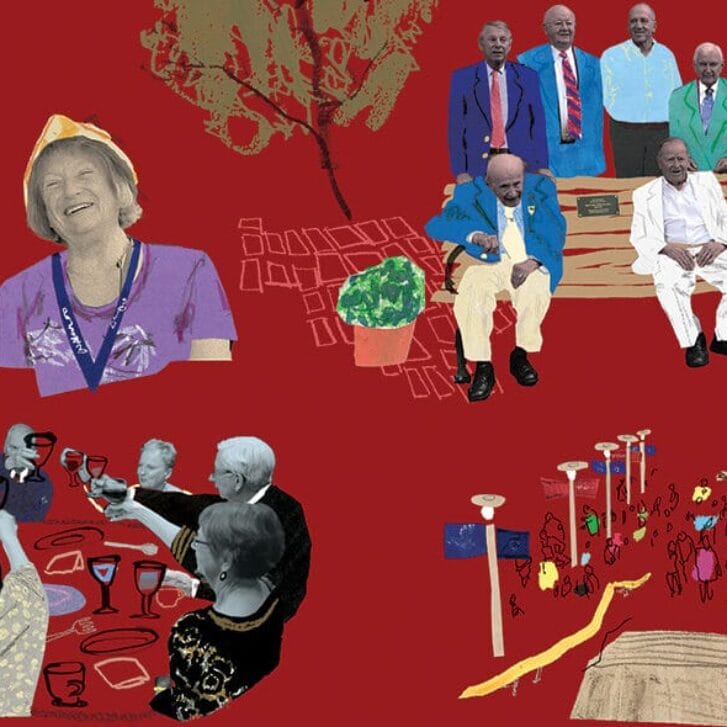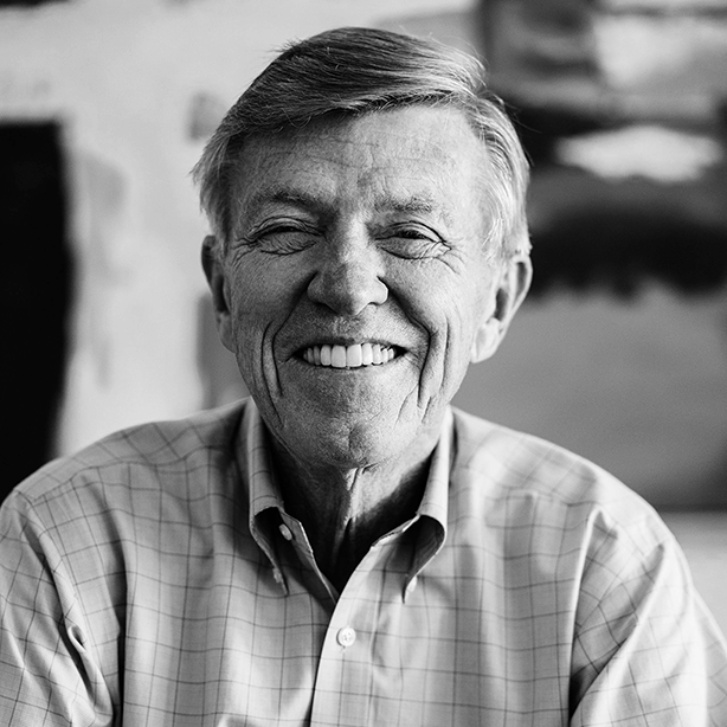We’ve heard it all before: After a great education and a full career, older alumni are expected to sit back and watch the world go by. But with a corpus of knowledge, skills, experience, and accomplishments built over a lifetime, it only makes sense to stay active and use those invaluable assets. The Wharton Graduate Emeritus Society has taken tangible steps to help make that happen.
Known as WGES, the society counts as members every Wharton graduate with diploma in hand at least 40 years ago, with roughly 7,000 current members. Founder Jack Smith W51 WG52, who started the group in 2006 and guided its development until his recent passing, felt mature alums were too valuable to be “put out to pasture.” The society’s original mandate was to give older graduates a stronger voice in alumni affairs and to foster closer, more meaningful relations with each other, their alma mater, and the world at large. In 2010, however, a major event at the group’s annual May Reunion luncheon expanded both role and reach.
Improving Quality of Life
From its start, the society has featured notable luncheon speakers, including Dave Power WG59 of J.D. Power and Associates and John Sculley WG63 of PepsiCo and Apple fame. The 2010 speaker was Bob Crandall WG60, former chief of American Airlines and a big believer in “generational change” — helping to make other’s lives better later by doing good works now. Whether helping a neighbor locally or a charity with global impact, he believes no group has better credentials than WGES members to improve the community at large, a message the society has taken strongly to heart.
Following Bob’s inspiration, WGES developed the Crandall Challenge, a dynamic program that asks members to tell the story of their good works in retirement and judges them via two different tracks: community/regional work, and national/international efforts.
The society doesn’t want competition. The Crandall Challenge aims to improve the community at large by showcasing retirees’ good works. It’s not a contest, but a celebration. After judging, some submissions are given Crandall Challenge Citations at the annual luncheon, but all submissions are heralded during the event and featured permanently on the society’s website.
An example of a previous recipient for international work, Charley Decker WG64 had a fast-moving career on Madison Avenue. In retirement, he moved part-time to the Dominican Republic and volunteered at an orphanage. In time, he began a foundation that now supports 1,000+ children in three orphanages, an activity center, and a mini-school; several students have gone on to medical school, civil engineering, and the arts. His foundation is now developing college scholarship and job training programs. Charley loves seeing early wards helping make life better for others.
On the regional level, Richard Tecca WG58 has sung with the Hartford Chorale and serves as vice president of marketing in retirement, creating a website and Facebook initiatives and helping to secure three major grants for the group. Concurrently on the Connecticut Gilbert & Sullivan Society’s board, he established audience surveys, an online box office, and an electronic database. In both organizations, his work has expanded audiences, reduced costs and, most importantly, exposed thousands of people to exceptional music.
2020 Awards
This year, the Crandall Challenge Citation was awarded to four WGES members, two for their local/regional efforts and two for their national/international work:
Local/Regional Recipients
Reid Becker WG74, of Zirconia, NC, pursued a career that included starting his own medical diagnostic business. When he retired, he become part of STEAM Tech Teams, a group of volunteers who work to support science, technology, engineering, arts, and math programs in schools located in the Greenville, SC, metro area. The volunteers are retired professionals active in the Osher Lifelong Learning Institute of Furman University. Their programs focus on: e-Nable prosthetic hands, the Vex Robotics Competition , biomolecules, quadcopters and drones, and 3–D printing and designs. E-Nable is a worldwide movement of engineers, occupational therapists, professors, designers, families, artists, students, teachers, and others who want to make a difference by 3–D printing hands to distribute for free to children all over the world. More than 700 hands have been created by over 3,200 volunteers around the globe.
William Sands WG66, of St. Paul, MN, is involved with the Neighborhood Development Center, an institution established to promote entrepreneurial talent, energy, and ideas that develop and revitalize neighborhoods. NDC promotes its mission through four programs: entrepreneur training; small business lending and financing; technical assistance; and business incubation. The group has initiated the Build From Within Alliance with organizations across the country that are adopting and adapting the NDC model. Together with his wife Susan, Bill has also funded the Sands Family Social Venturing Fellowship for students at the University of Minnesota’s Carlson School of Management.
National/International Recipients
Following a career in several Philippine companies that included electric and water public utilities, as well as electronic and pharmaceutical businesses, Filemon Berba WG64, of Antipolo, Philippines, has devoted his retirement to the Philippine Foundation for Science and Technology. PFST, of which he is a founder, aims to expose a critical mass of young people to science, with the intent of preparing them for careers in engineering and technology. As president and chair of PFST’s board of trustees, he has developed outreach programs that involve 400,000 Philippine high school students each year. The group created the Philippine Science Centrum, the first interactive science museum in the country. Since the Philippines is an archipelago, PFST has created seven mobile exhibits that over the years have been visited by seven million students and teachers. They have trained 6,000 teachers across the country. Filemon also serves as a member of the board of trustees for the Philippine Science High School System, the University of the Philippines, and Batangas State University.
Russell Redenbaugh WG69, of Glen Mills, PA, built a successful career as a registered investment adviser while overcoming barriers for those with impaired vision. He was a commissioner of the U.S. Commission on Civil Rights for 15 years and created a foundation devoted to inspiring others to shift their self-limiting narratives. The program was designed to help people recognize and overcome moments where they are, or have been, a victim. Of his work, Russell says: “My own life informs us that we can be much more than we ever imagined, but it takes faith in the possibilities of everything we are as humans. It takes believing in oneself and shifting one’s narrative away from ‘I can’t’ to ‘I will.’ And most of all, it takes the encouragement, development, and cultivation of better habits and the willingness to abandon habits and ways of thinking that are not useful.” To that effect, in 2013, Russell shared his story and learnings about how one can “shift their narrative” in a TED Talk, followed by the 2017 publication of his memoir, Shift the Narrative: A Blind Man’s Vision for Rewriting the Stories that Limit Us.
Ready to Pick Up the Pace
Wharton takes pride in being the first — and perhaps only — major U.S. graduate business school with organized emeritus alumni and a specific mission. While it’s nice to be first, the world needs more help than one alumni group can provide. WGES hopes other schools will follow the lead and establish their own groups with charitable aims. The society is ready to meet with emeritus alumni of other schools who are interested in serving themselves, their alma mater, and the community. Sure, it’s good to smell the roses in retirement. But it’s even better to give a few to those for whom flowers are an unattainable luxury.
Perhaps Winston Churchill said it best: “We make a living by what we get, but we make a life by what we give.”
Thomas Vincent WG56 is a longtime senior member of the Wharton Graduate Emeritus Society’s steering committee.


























